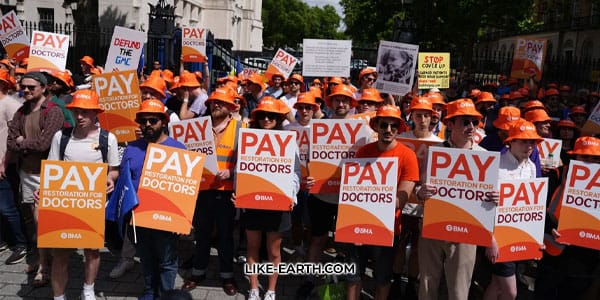Ministers Brace for NHS Strikes After Doctors Denounce ‘Derisory’ Pay Rise

Ministers Brace for NHS Strikes – NHS strikes doctors derisory pay rise crisis continues to escalate as UK ministers prepare for fresh industrial action. On May 23, 2025, doctors’ unions condemned the latest government pay offer, setting the stage for another wave of walkouts that could cripple healthcare services across England.
The British Medical Association (BMA) has slammed the proposed 2.5% salary increase, calling it “insulting” and “a betrayal” of the sacrifices made by medical professionals, particularly in the aftermath of the COVID-19 pandemic and ongoing NHS pressure.
Background: NHS Pay Dispute Reignites Tensions
This latest dispute follows more than a year of fractured negotiations. Doctors, particularly juniors and consultants, argue that real-term pay has been eroded by more than 25% over the past decade.
The current offer, announced by the Department of Health and Social Care, sparked immediate backlash. Doctors argue it fails to account for inflation and the increased workloads they face due to chronic NHS understaffing.
“The government is completely disconnected from reality,” said Dr. Vivek Tranter, a junior doctor based in Manchester. “We cannot accept crumbs while being expected to work 70-hour weeks in overcrowded hospitals.”
Doctors Call for Fair Compensation
The BMA has demanded a pay uplift of 35% to restore earnings to 2008 levels. While ministers argue that such a figure is fiscally unsustainable, unions maintain that it’s essential for retention and morale.
“We’ve been warning about a staffing crisis for years,” said BMA council chair Professor Phil Banfield. “Low pay is pushing doctors abroad or out of the profession entirely.”
Indeed, NHS workforce data indicates a sharp rise in emigration among junior doctors, particularly to Australia, New Zealand, and Canada—countries offering better wages and work-life balance.
Strike Action Looms
With ballots underway, doctors are expected to approve another round of industrial action in early June. This could mean further cancellation of elective surgeries, outpatient appointments, and increased pressure on emergency departments.
Last year’s strikes led to over 1.2 million appointment cancellations, with many patients waiting months for rescheduled care.
Health Secretary Amanda Lister warned, “Strike action will endanger patient safety. We urge doctors to reconsider and return to the table.”
However, doctors claim they’ve been left no choice. “We’re fighting for the future of the NHS,” said one London consultant. “This is not just about pay—it’s about survival.”
Public Support and Reactions
Public sentiment remains divided. While many sympathize with doctors, others express concern over the timing and impact of the strikes.
Polling by HealthWatch UK found that 61% of respondents support doctors’ right to strike but 45% are worried about how it will affect vulnerable patients.
“The government must do more to avoid this disaster,” said patient rights campaigner Anne Gillespie. “We need a functioning NHS, not more conflict.”
Government Response
Downing Street has reiterated its commitment to dialogue but ruled out significant changes to the current pay offer. A spokesperson said, “We value NHS staff immensely, but must balance fairness with economic responsibility.”
Prime Minister Rishi Sunak faces pressure from both the Treasury and public health advocates to find a compromise that avoids further damage to NHS operations.
Critics argue that repeated disputes signal deeper systemic issues. “This isn’t just a pay issue—it’s about the government’s approach to public services,” said economist Sarah Kendall.
Impact on NHS Services
Hospitals have begun emergency planning to mitigate disruption. Trusts across the country are drafting contingency plans and preparing to deploy senior staff to cover junior roles.
Some hospitals have already reduced elective care and postponed non-urgent procedures in anticipation of a summer of unrest.
“The NHS is at breaking point,” said an NHS England spokesperson. “We urge both sides to reach a resolution to protect patient care.”
What Happens Next?
If no resolution is found, walkouts could begin as early as June 5. The BMA has not ruled out prolonged strike action, including coordinated efforts across departments and regions.
Ministers are under increasing pressure to avoid a repeat of last year’s disruption, which cost the NHS over £1 billion in lost productivity and backlogs.
Healthcare leaders say urgent action is needed not just to avoid strikes, but to rebuild trust and restore the NHS as a viable career option for new doctors.
Stay Informed and Take Action
For real-time updates on this developing story, follow our official WhatsApp news channel. You can also explore broader healthcare analysis and policy discussions on our main site Like Earth.
Final Thoughts
The NHS pay dispute is reaching a critical juncture. Doctors say the current offer is derisory and unsustainable. Ministers argue they must be fiscally responsible. Meanwhile, patients wait—and worry.
Will the government budge, or will Britain face yet another healthcare crisis? All eyes are now on Downing Street as the nation braces for impact. Ministers Brace for NHS Strikes
Share This Article
Let your friends know about this exciting news!



